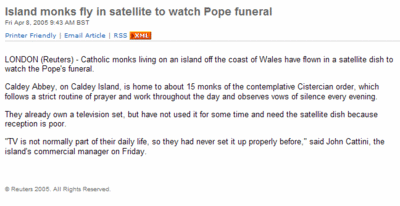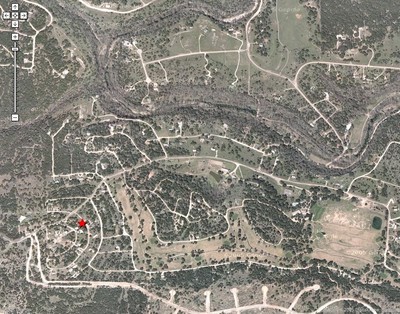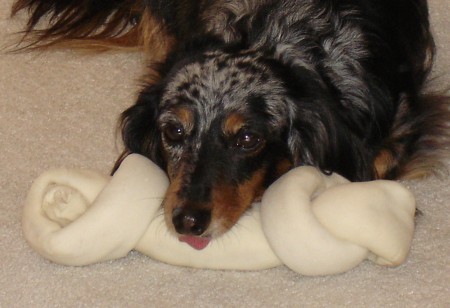From the unfortunate-use-of-the-English-language department (click image to see a larger version):

Personal
My memory map: Spring Branch, Texas
Since satellite photos were added to Google Maps a few days ago, a lot of bloggers are showing ‘memory maps’: satellite photos of places they’ve lived. Here’s my contribution.
In 1970, when I was eight years old, we moved from Wichita, Kansas, to Spring Branch, Texas, north of San Antonio in the Texas hill country. We moved to Cypress Lake Gardens, a subdivision that had been started in the mid-1960s and was planned as a high-class resort with golf course, airstrip, etc. When we moved in, few houses had been built, the golf course was unfinished, and the streets were all still caliche (dirt). A year or so later, the developer was murdered, so the subdivision went into bankruptcy and receivership. Consequently, it remained in pretty much the same state until I left in 1982.
It was a pretty lonely place to grow up. Since I traveled twenty miles to elementary and middle schools and eleven miles to high school, I saw most of my friends only at school–at least until I got a car and a driver’s license.
On the other hand, my playground consisted of thousands of acres of undeveloped Texas Hill Country. The satellite photo shows a creek running through the area. This is Rebecca Creek, which features clear springs, incredible remote canyons to explore and one of the greatest swimming holes I’ve ever seen.
Differences between then and now: there are about twice as many houses now–though it’s still pretty sparsely developed–and the golf course was finished and opened a few years ago. The side streets of my old subdivision are still caliche. That big road with several cul-de-sac streets coming off of if at the bottom of the image looks like a new subdivision (looks like the streets were still being developed when the satellite photo was taken).
I identified our former house with a star. Click on the image below to see a larger version (Warning: it’s big: 375KB):

Personal
I’m a new man!
I’ve been an avid runner since my teens, and I was active and fit through my twenties. Grad school was good for that: due to my flexible schedule, I could run when I wanted, and my bicycle was my primary transportation around town.
But right after I turned thirty, that all changed: I was no longer a full-time student; I got my first sit-on-my-ass-all-day job in software development; we moved from sunny Austin to New Jersey; and, within a few months, we had our first child. As a result, I struggled with my running, and consequently, my fitness and weight. Moving back to Austin helped a little: I ran the half marathon in 1998 and 2001, but my running routine remained very up and down.
This situation improved somewhat when I took my current job last summer. Our office complex has a small gym with treadmills, so I started coming in early on Tuesdays and Thursdays to beat the traffic and run before work. And now that it’s spring, I’ve run at the Town Lake hike and bike trail a few times instead of on the treadmill.
Last fall, when I saw my family physician for my annual checkup, she noted that I had gained a couple of pounds a year for the past ten years–starting at about age thirty.
In November, Katie and I decided that we would try a low-carb diet and really try to improve our family’s eating habits. We already ate pretty well, but there was still room for improvement, we felt. We did some research and decided on the South Beach diet.
We started our new eating regimen at the first of the year. I weighed 235 pounds at the time. I’m 6 ft, 1/2 inch tall, so that gave me a body mass index of 31, which is technically obese. It was a struggle to run 3-4 miles at a time on the treadmill.
I’ve since lost between 25 and 30 pounds, and my usual treadmill run has increased to five or six miles. This morning, I ran one hour, four minutes on the hike and bike trail, which is between seven and eight miles.
After this morning’s run it hit me: I’m back! I feel like I’m in a good running routine for the first time in years.
Personal
DVR bug!
Several months ago, we got a digital video recorder from our cable provider, Cox Communications. In general, I’ve been very happy with it (mentioned previously here and here).
But yesterday evening, I noticed that it hadn’t recorded any of the series I had scheduled. I went into the series scheduling and discovered that they were all an hour off! We changed to daylight savings time on Sunday morning, and the time on the cable box updated appropriately, but the recording times didn’t update! I had to re-schedule all my series recordings. I’d hate to be a Cox technical service rep this week.
Intellectual
Opposing views about breast cancer
Breast cancer is a big issue in Katie’s life: her maternal grandmother died of it; her mother has had two types of it and is currently living with metastasized bone cancer. I just ran across two interesting contrasting commentaries by breast cancer victims: noted feminist Barbara Ehrenreich, and a recent Newsweek “My Turn” commentary.
Religion
All Pope, All the Time!
It seems every time I’ve turned on the TV or radio since Saturday, it’s been round-the-clock hagiography of Pope John Paul II. In the midst of this unadulterated mass media worship, one of my favorite bloggers, Eliot Gelwan, remains skeptical:
“World mourns,” or something similar, most of the headlines say. Of course, I’m no Catholic, and I say this with all due respects to the feelings of my Catholic and other readers who may have felt in some sense that they have lost a spiritual leader of theirs. He was certainly a very pious man and probably a very nice person. But I’m sorry, I just cannot feel all that griefstricken about the death of the Pope. His greatness, such as it was, seemed to lie in having been some mixture of captive and facilitator of the reactionary ideology of a rapacious establishment that does little good for the world, in the process facilitating third world overpopulation and poverty, the epidemic spread of AIDS and unwanted pregnancy, and generally oppressing people on the basis of their gender, their sexual preferences and their level of susceptibility to guilt. I grieve for them; their funerals are far less lavish.
John Paul’s greatest papal role models were apparently a pope from the sixth century and nineteenth-century Pope Pius IX, who was disparaged by many as anti-Semitic but whom he beatified. It was during Pius’ reign that the Church had promulgated the doctrine of papal infallibility, which John Paul cherished. His conservative authoritarianism has polarized both the Church and the world’s view of Catholicism. He is celebrated for his inclusionism; he had to reach outside the Western world, where the Church’s grip is seriously eroded. He was the ‘rock star’ pope, a charismatic showman who did not so much embrace as seduce. He will be remembered for peddling the Church’s dogma by personal appearance, by travelling alot. You can’t blame a man for that; I wish my job involved more international travel. But it is not an achievement in itself, any more than there was any inherent heroism in being the first Polish Pope. Catholic intellectualism fared poorly indeed under this pope. He is credited with contributing to the downfall of Communism, which is quite a stretch in any sense other than that he came from a former Communist country. His greatest legacy, and it is a dubious one at that, may have been to hold the line against liberation theology. To put it simply, this was a papacy in which faith was stood to oppose both justice and thoughtfulness.
Especially because over ninety percent of the cardinals electing the next pope were appointed by him, he is likely to be succeeded by another who largely fits the very same mold, ad infinitum. The Catholic Church grows quickly bankrupt in the Western World. The next Pope, if not from the developing world himself (could the Church seriously entertain the idea of a non-white yet?) must be someone appealing to the heathens in the fertile Third World waiting to be converted and exploited for the continued sustenance and survival of the Church.
How much of a sober appraisal of the impact of Catholicism and the true significance of its leader for the latter quarter of the twentieth century, the only Pope half the world’s people have ever known, will we get in the orgiastic media frenzy covering his death?
I don’t know the validity of many of Eliot’s claims, but I appreciate that he bucks the status quo of the mindless media. As a non-Catholic Christian, Eliot’s concerns remind me that while I’m sure the pope tried to do good, he did so within the constraints of a fallen humanity.
